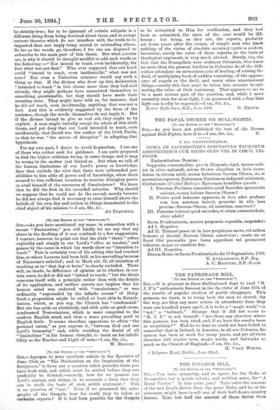[To THE EDITOR OF THE " SPECTATOR."]
Srst,—As you have mentioned my name in connection with a 'recent " Declaration," you will kindly let me say that my -share in the drafting of it was confined to a few suggestions.
I venture, however, to point out that the sixth " thesis " refers --explicitly and simply to our Lord's " office as teacher," and passes by the cases in which his words show no "intention to teach." This is certainly true of his asking who had touched him, or where Lazarus had been laid, or his marvelling because -of Nazarene's unbelief ; and in Mark xiii. 32, all intention of -teaching as to " that day or hour," is clearly excluded. There
no doubt, be difference of opinion as to whether, in cer- tain cases, he did or did not " intend to teach; " but the thesis -concerns itself with a principle rather than with the details -of its application, and neither asserts nor implies that his human mind was endowed with " omniscience," or was -ordinarily "superseded by the infinite reason" of Deity. Such a proposition might be called at least akin to Entych- ianism, which, as you say, the Church has "condemned." But she has quite as absolutely, and with quite as good cause, -condemned Nestorianism, which is more congenial to the --modern English mind, and thus a more prevailing peril to English faith. It seems therefore opportune to affirm "the personal union," as you express it, " between God and our Lord's humanity," and, while avoiding the denial of all -" limitations " in his human thought, to insist on his infalli- bility as the Teacher and Light of men.—I am, Sir, &c., W. BRIGHT.


















































 Previous page
Previous page